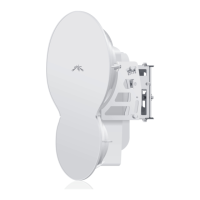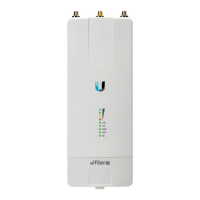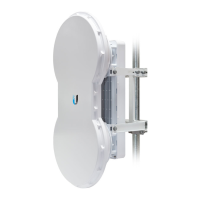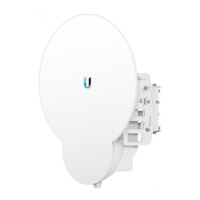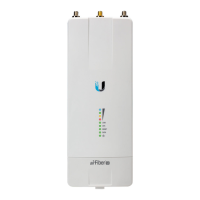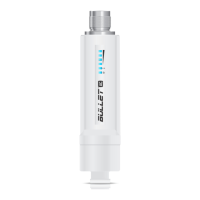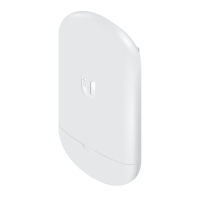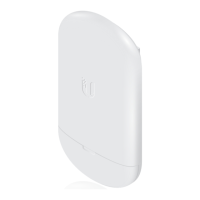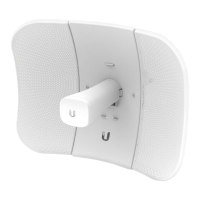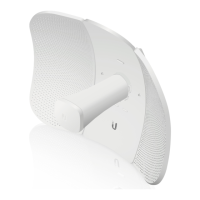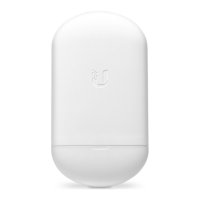
Do you have a question about the Ubiquiti airFiber AF-11FX and is the answer not in the manual?
| Max Range | 200+ km |
|---|---|
| Power Consumption | 15 W |
| Channel Width | 20/40/80 MHz |
| Antenna Gain | 30 dBi |
| Ingress Protection | IP67 |
| Channel Bandwidth | 20/40/80 MHz |
| Modulation | QAM 64, 256 |
| Power Method | PoE |
| Operating Temperature | -40°C to 55°C |
| Encryption | AES-128 |
| Mounting | Pole Mount |
Provides an introduction to the airFiber AF-11FX User Guide and its intended use.
Lists the software and browser requirements for accessing the airFiber configuration interface.
Identifies and illustrates the key hardware components of the airFiber AF-11FX device.
Details the items included in the airFiber AF-11FX product package.
Describes the function and location of each physical port on the airFiber AF-11FX.
Explains the various status LEDs on the airFiber AF-11FX and their meaning during operation.
Provides further details on the status and meaning of additional LEDs on the airFiber AF-11FX.
Outlines the necessary prerequisites and requirements for installing the airFiber AF-11FX.
Provides a summary of the airFiber AF-11FX installation procedure.
Step-by-step instructions for installing the duplexer in SISO mode.
Instructions for installing an additional duplexer for MIMO mode operation.
Guide on how to connect power to the airFiber AF-11FX using Power over Ethernet.
Details on how to access and configure the airFiber AF-11FX through its interface.
Provides instructions for the physical installation of the airFiber AF-11FX.
Instructions for properly grounding the airFiber AF-11FX unit.
Steps for mounting the airFiber AF-11FX radio onto the airFiber X antenna.
Instructions for connecting the data cables to the airFiber AF-11FX.
Covers both Power over Ethernet and DC Power connection methods.
Recommendations for installing surge protection for the airFiber AF-11FX.
Tips and techniques for accurate antenna alignment to optimize link performance.
Procedure for establishing and optimizing the wireless link between two radios.
Details the installer's responsibilities regarding regulatory compliance.
Guide on how to connect to and log into the airFiber configuration interface.
Describes the main pages (Dashboard, Settings) and their functions within the interface.
Explains how pending changes are handled and saved within the configuration interface.
Information on how to verify if the airFiber product is genuine or counterfeit.
Summarizes current link status, local and remote device information, and network status.
Details the local device's status, signal strength, capacity, and configuration settings.
Details the remote device's status, signal strength, capacity, and IP address.
Displays signal strength, capacity, and speed information for both chains.
Shows device status, firmware version, operating mode, and link status.
Provides details on management and data port status, including cable diagnostics.
Configures core wireless settings like mode, link name, country code, frequencies, and radio mode.
Sets the maximum average transmit output power (in dBm) of the airFiber X radio.
Specifies the gain (in dBi) of the antenna used in the installation.
Enters the cable loss (in dB) of the cable used in the installation.
Configures the Automatic Transmit Power Control (ATPC) feature.
Sets or automatically adjusts the modulation rate for optimal throughput.
Displays valid frequencies based on country code selection for compliance.
Configures wireless security using 128-bit AES encryption.
Specifies the security key type (HEX or ASCII) and value.
Provides access to advanced wireless features like Enhanced MIMO and Power Backoff.
Configures management IP address, Netmask, Gateway, DNS, VLAN, and Auto IP Aliasing.
Configures Data port speed, duplex, and flow control settings.
Settings to control failover switching based on capacity loss due to rain.
Enables continuous ping monitoring and automatic reboot if the target is unreachable.
Configures the SNMP Agent for device monitoring and network provisioning.
Settings for enabling and configuring the Web Server, including secure connections.
Enables and configures SSH access, including password or key authentication.
Activates and configures Telnet access to the airFiber X radio.
Configures the Network Time Protocol client for system time synchronization.
Enables and configures Dynamic DNS for maintaining access via domain name.
Enables system logging and configuration for remote syslog servers.
Enables discovery of Ubiquiti devices on the network.
Instructions for checking for and uploading new firmware to the airFiber X radio.
Configures the device name, interface language, and reset button behavior.
Sets the time zone and startup date for the airFiber X radio.
Manages administrator and read-only account passwords for security.
Displays the GPS-determined latitude and longitude of the device.
Provides options for rebooting, backing up, uploading configurations, and downloading support info.
Resets the airFiber X radio to its original factory default settings.
Allows downloading the current system configuration file.
Enables uploading a new configuration file to the airFiber X radio.
Generates a support information file for troubleshooting.
Tool to point and optimize the antenna for maximum link signal strength.
Searches for and lists all Ubiquiti devices on the network.
Tests network connectivity and estimates link quality and latency between devices.
Traces the network route taken by ICMP packets to a destination host.
Displays registered system events when logging is enabled.
Provides essential safety information regarding electrical connections and equipment handling.
Details the warranty period, conditions, and exclusions for the product.
Outlines the process for product returns, including obtaining an RMA number.
Disclaims all other warranties, express or implied, including merchantability and fitness.
Specifies the limits of Ubiquiti's liability for damages arising from product use.
Highlights the installer's duty to ensure compliance with local regulations and licensing.
Notes that the AF-11FX requires a license to operate in most countries.
States compliance with FCC rules and the need for a station license in the US.
Lists the AF-11FX frequency plan compliant with FCC and IC specifications.
Provides warnings and guidelines regarding RF exposure and antenna installation.
Information on proper disposal of electronic equipment according to EU directives.
Provides contact information and details about Ubiquiti's dedicated support engineers.
Lists links to support, community forums, and software downloads for airFiber products.
